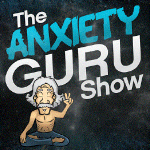
If I asked you to tell me what anxiety is I’m sure you’d do a fine job.
After all, you know your stuff.
You could probably tell me a lot about what your anxiety feels like, what fear feels like, even what terror feels like.
I’m confident that you could give me all the intricate details.
In fact, I’m sure you and I could easily get lost in the details of your latest complaint, but what would be the point?
I know why you do it. You’re on the lookout for danger. You’re anticipating, calculating, always watching.
To be fair, I understand this tendency quite well. I was the same way for the better part of a decade.
But I can assure you that this approach is a dead end.
One of the most important things I ever did to get better was to take a step back and look at the basic details.
basic (adjective) \’ba-sik also – zik\
: forming or relating to the most important part of something.” -Merriam Webster
I got away from my moment to moment safety analysis and instead took a dive into the engine that drove my fear.
Because you see, your real problem is fearfulness.
But here’s the kicker, the thing that generates your scary symptoms isn’t fear. It’s stress. But not just any old kind of stress.
Fearfulness (noun)
: the emotion experienced in the presence or threat of danger.”
– Merriam Webster
Over time I realized that what I had to address was chronic stress, rather than its more mysterious cousins anxiety and fear.
Of course, stress and anxiety are not the same. Believe me, I know that you’re not simply stressed out.
Chronic stress is different though. It comes with some serious side effects. Actually, they look pretty familiar, right?
- anxiety
- panic attacks
- depression
- social isolation
- stomach problems
- sleep problems
- problems concentrating
- hypertension
- back pain
Now, if you stay stressed long enough you can indeed develop abnormal anxiety (long-term anxiety and fear).
But what I want you to understand is that fighting anxiety directly is like fighting a ghost.
That’s why most of your recovery efforts must target anxiety indirectly. And today I’m going to show you how to do that.
In this episode of The Anxiety Guru Show I discuss:
- The difference between stress and anxiety
- Why you should be more focused on stress reduction
- Specific ways of lowering stress
- Benefits of stress reduction
To listen, you can either click on the icon below or browse AG show episodes on iTunes.






Thank you, Paul!
You bet Ashley!
I’m suffering from hormonal issues which are giving me anxiety (but of course my own mind has compounded the problem) but I’m sure this is a question every anxiety suffer worries about at some point.
How do you know when recovery is achieved? How do you know when to consider yourself back to normal again. Isn’t the thought of “Am I my normal self” itself indicate that you aren’t…
Sometimes I can really drive myself in crazy thought circles despite the fact I am approaching recovery (65-70%)
Good question Rob. I think you know that you’re better when you don’t have to ask that question.
That’s how it happened to me anyway. After years of being anxious I began to improve and my wife simply asked: So you’re not anxious anymore?
She asked me. Before that I would ask her things like “what do you think is wrong? Will I ever get better? I had never-ending questions.
Once I got better I stopped asking questions period.
Wow!!!!! I 100% agree with you re: the poor guy’s situation upon starting therapy, Paul! He does NOT need this approach at all! I had a similar situation with the first mental health professional I saw – I am terrified of taking meds after the drug induced near fatal anaphylaxis I had. Luckily, I was ‘rescued’ by another Consultant Psychiatrist and Psycotherapist I saw who could clearly see that I needed good talking therapy, with the OPTION of meds. That was in July this year. I have had weekly sessions since and have improved a great deal, so much so that we have now agreed to end therapy as my therapist believes I now have the tools in place to keep moving forward with my recovery. I also told my therapist about Anxiety Guru and how it has been a HUGE help to me, it was your work Paul that really kick started my recovery! Your email correspondent deserves a fair chance at trying therapy, like I did. I DIDNT need the meds in the end, and maybe neither will he if he is just given the chance of good therapy and support. I hope with all my heart that he WILL seek a second opinion – every one deserves the chance of recovery! Thanks again for another great podcast, Paul!
Hi Paul,
I’m also “erked” at that psychologist that you mentioned on this podcast. I had a similar experience at the onset of my high anxiety a few years ago. I went to see a CBT therapist and told him that I was adamant that I didn’t want to use meds to treat my anxiety. We went through a handful of visits, and I completed quite a few CBT assignments successfully and was starting to get a better idea of my thinking, but was still experiencing moderate to severe physical symptoms. He told me that he felt that I may have a biological factor driving my anxiety and he wanted me to meet with his associate that was a prescriber to talk about meds; to the tune of a $300 consultation fee I might add. Needless to say I ended my sessions right then and there. It’s sad that so many therapists are not able to really listen to their patients and point them in the right direction. The medical community is so far behind the mark on anxiety and it’s extremely sad, because it is totally possible to recover from this frightening cycle of suffering. You’re doing a great job in un-masking anxiety and bringing real help to sufferers to show them that this isn’t some horrible beast that the sufferer’s imagination makes it out to be. It’s a set pattern; it has limits, and nothing about these symptoms can harm someone. I’ve learned so much from the teachings of Dr. Claire Weeks, as you’ve mentioned before on the site, and also from the Freedom From Fear Recovery group, whose method follows the teachings of Dr. Weeks. The only reason that sufferers do not recover, is because they aren’t shown the way. It takes time to de-sensitize and normalize the fear response, but that’s all it is. Thanks again for all you do – it takes someone that’s been there to TRULY help people back out into the world.
hi paul, im 58 years old,iv been suffering from anxiety for over a year now,ive got everything in life I want,but it hit me hard, you talk a lot of sense,
Great podcast this week, Paul. Relieving or even lowering the stress levels really should have a positive effect on someone’s overall anxiety problem.
Thanks Paul!
Hey tony, that’s the strange thing about high anxiety, sometimes it comes for no clear reason. But whatever the cause I feel strongly that anyone can get better if they focus on recovery. Stay focused my friend!
Hi Cheryl, love the passion! I agree with you. I think some therapists often stop thinking for themselves and rely too much on what they have heard works. Fact is, treating anxiety is hard work, but that’s why the therapist should be there to join the struggle and not rely on worksheets alone. Just because a problem is frustrating does not mean that one should quit!
Thanks for sharing Marie. Well, there you go. Sounds like you and your therapist did not quit and got results. Perhaps people forget that therapy take time as well as effort. It is not always enough, but you gotta give it time!
After listening to this podcast, I’m a bit ambivalent because if an anxiety disorder is not a ”disease” why do medications work?
I mentioned before I thought I had all the tools but after quitting my meds I ended up in the worst shape ever and it took me over a year to get back to normal with occasional speed bumps.
I’m glad I live in a time where such drugs are available. However, I’d rather not use them of course.
I feel a bit guilty for not being able to do it on my own and also that I probably will be needing them all my life.
So if it’s not an illness, why is it treated as such with success?
My doctor compares it to diabetes or thyroid problems; even with good habits, some people still need the chemical help.
I was told the same thing as your email writer by medical doctors and you know what? It worked to a point. I was also on CBT and it’s not a cure. It’s simply a set of tools. I thought I could do it with good habits and CBT. I was wrong. I was also afraid of the drugs. That is why I quit in the first place. Then I was afraid the drugs didn’t work anymore. Then I was afraid that the reason my anxiety came back was BECAUSE of the drug and my ”addiction” to it. I became quite paranoid and afraid of all the bad press drugs had.
I only went back as a last resort. Thank goodness it worked.
I do have bad days still, but I can cope.
SSRI’s and the likes ARE over-prescribed but I also think that they can greatly improve the quality of life of certain people, like myself. That is why they are not to be demonized in my opinion.
I couldn’t eat or sleep. Ever. I had a resting heart rate of 140.
Now I feel normal 90% of the time.
I think if it’s not an illness, it’s not something you can simply get rid of with diet and meditation, at least for some. At least for me.
Well said by the girl above!
Hey Paul,
I know this is 10 years old but when you have dysautonomia (i have POTS and severe autonomic nervous system dysfunctiom) the adrenaline surges that you get (pulse >180, bp 190/105) start a hyper-panic attack which has a physiological base. In this case SNS is overractive and SSRI do help in this case. Of course the anxiety, hypochondria, etc. are developped as well and should definitely use psychotherapy for this. Its a complicated mixup of triggers and symptoms. When you read about monks for example and what their mind is capable of, a lot of this could probably be done without meds but it wil take months if not years od being in zen mode, working on yourself and truly dedicating yourself to recovery, which is then the TRUE recovery. So, idk, wish you all the best, its a good podcast.